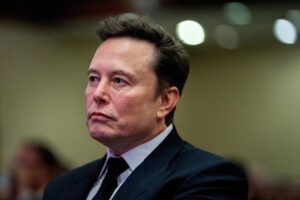Tesla’s $56 Billion Compensation Package: Legal Rulings and Shareholder Concerns
Recent developments regarding Elon Musk’s controversial compensation package have left investors speculating about the future of leadership and corporate governance at Tesla. A Delaware judge has upheld the prior ruling that deemed Musk’s pay excessive, despite a shareholder vote aimed at reinstating it. The implications of this decision could ripple throughout corporate compensation structures in the automotive sector and beyond.
The Court’s Ruling: A Firm Stand on Excessive Pay
In a decisive ruling, Chancellor Kathaleen McCormick of the Delaware Court of Chancery reiterated her stance from January, asserting that Musk is not entitled to the eye-popping $56 billion compensation package. This shocking decision raised eyebrows among investors, as it cast doubt on Musk’s future with the company. McCormick’s opinion, a detailed 101-page document, emphasized the importance of corporate governance and the role of the board of directors in setting compensation without undue influence from executives.
Musk’s legal team argued that a subsequent shareholder vote in June, which favored reinstating his pay package, should be recognized. However, McCormick dismissed this contention, asserting that allowing the board to reset decisions undermines judicial authority and sets a dangerous precedent for corporate behavior.
The $345 Million Question: Legal Fees at Stake
The court didn’t just question the legitimacy of Musk’s compensation; it also ordered Tesla to pay $345 million in attorneys’ fees to the plaintiffs. This figure was a fraction of the $6 billion originally sought, which raises further discussions about the financial consequences of corporate governance disputes. The fees can be settled in cash or Tesla stock, which could affect share valuations and investor sentiment going forward.
Shareholder Sentiment: A Divided Base
Tesla shareholders have made their voices heard, with many subsiding thousands of letters to the court following the initial January ruling. Concerns have been raised that rescinding Musk’s pay could threaten his commitment to Tesla and push him toward pursuing projects under different banners, particularly given his ambitious aspirations in areas like artificial intelligence.
Richard Tornetta, the shareholder behind the lawsuit, has argued that Delaware’s laws restrict companies from using shareholder ratification as a means to negate judicial rulings. The tension surrounding executive compensation underscores a growing unease among stakeholders about the alignments of incentives and executive accountability in the modern corporate landscape.
The Future of Tesla’s Governance
Chancellor McCormick’s ruling shines a spotlight on the intricate relationships between board members and executives. It reveals a disturbing, yet familiar, narrative in which boards may hold biases or conflicts that affect their decisions. McCormick suggested that Tesla’s board composition exhibited signs of being beholden to Musk, calling into question the integrity of the governance process.
Moreover, the court ruled that Musk had manipulated the 2018 decision-making process around his compensation package, which was initially justified on the grounds of Tesla meeting ambitious operational and financial goals. Musk has vehemently defended his record, yet his criticisms of the judicial system—especially in light of public comments made on his platform—illustrate the complexities at play between personal belief systems and corporate governance realities.
The Bigger Picture: Implications for Corporate America
As this ruling potentially sets a precedent, it raises critical questions about executive compensation practices across industries. If corporate boards are unable to act independently of influencer executives, stakeholders may increasingly challenge compensation structures that appear unmerited or excessive.
The fact that Musk’s pay package was initially pegged as the largest in history paints a stark picture of the disparities that exist within corporate America. From an investment viewpoint, the ruling may lead to re-evaluations of how much trust investors place in corporate governance frameworks.
At Extreme Investor Network, we understand the nuanced landscape of corporate governance and compensation. It’s imperative for investors to stay informed about systemic changes that impact company leadership and, ultimately, investment returns. Our focus remains on analyzing these trends and providing our readers with the insights necessary to navigate an ever-evolving financial environment.
Conclusion: The Road Ahead
Elon Musk and Tesla have the option to appeal this ruling to the Delaware Supreme Court, which may further prolong the uncertainty. As courts across the nation grapple with similar issues, investors and companies alike must consider how governance can evolve to reflect ethical standards in executive compensation, aligning stakeholder interests with the realities of modern business.
This situation underscores the importance of vigilance and engagement for shareholders who wish to protect their investments in companies led by larger-than-life personalities. As the landscape of corporate governance continues to shift, informed investors will be positioned to make decisions that align their values with their financial goals. Stay tuned with Extreme Investor Network for ongoing analysis and updates on this ever-evolving story.

